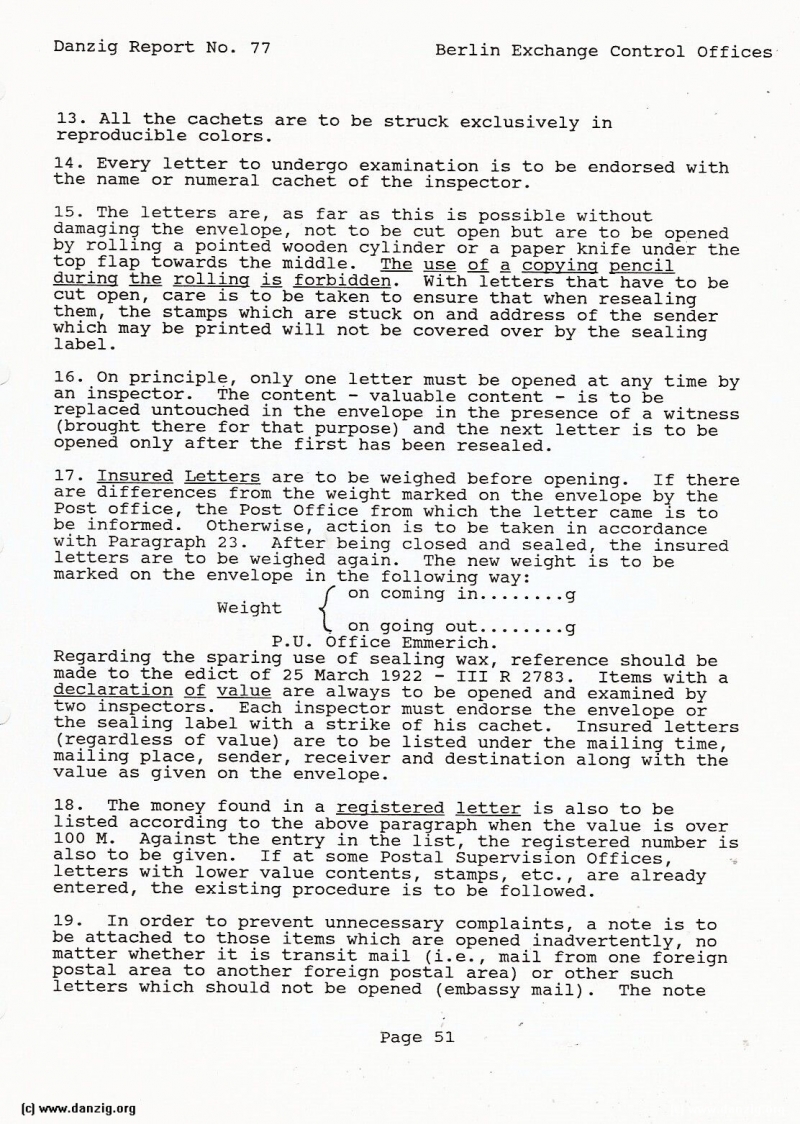
13. All the cachets are to be struck exclusively in reproducible colors.
14. Every letter to undergo examination is to be endorsed with the name or numeral cachet of the inspector.
15. The letters are, as far as this is possible without damaging the envelope, not to be cut open but are to be opened by rolling a pointed wooden cylinder or a paper knife under the top flap towards the middle. The use copying pencil during the rolling j forbidden. With letters that have to be cut open, care is to be taken to ensure that when resealing them, the stamps which are stuck on and address of the sender which may be printed will not be covered over by the sealing label.
16. On principle, only one letter must be opened at any time by an inspector. The content — valuable content — is to be replaced untouched in the envelope in the presence of a witness (brought there for that purpose) and the next letter is to be opened only after the first has been resealed.
17. Insured Letters are to be weighed before opening. If there are differences from the weight marked on the envelope by the Post office, the Post Office from which the letter came is to be informed. Otherwise, action is to be taken in accordance with Paragraph 23. After being closed and sealed, the insured letters are to be weighed again. The new weight is to be marked on the envelope in the following way:
Weight =on coming in g /on going out g
P.U. Office Eminerich.
Regarding the sparing use of sealing wax, reference should be made to the edict of 25 March 1922 - III R 2783. Items with a declaration of value are always to be opened and examined by two inspectors. Each inspector must endorse the envelope or the sealing label with a strike of his cachet. Insured letters (regardless of value) are to be listed under the mailing time, mailing place, sender, receiver and destination along with the value as given on the envelope.
18. The money found in a registered letter is also to be listed according to the above paragraph when the value is over 100 M. Against the entry in the list, the re9istered number is also to be given. If at some Postal Supervision Offices, letters with lower value contents, stamps, etc., are already entered, the existing procedure is to be followed.
19. In order to prevent unnecessary complaints, a note is to be attached to those items which are opened inadvertently, no matter whether it is transit mail (i.e., mail from one foreign postal area to another foreign postal area) or other such letters which should not be opened (embassy mail). The note
Danzig Report Vol. 1 - Nr. 77 - October - November - December - 1992, Page 51.
Hits: 2668
Added: 03/07/2015
Copyright: 2024 Danzig.org

